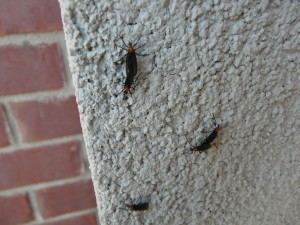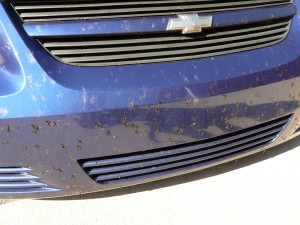Contrary to popular belief, lovebugs were not introduced to the state by the University of Florida. This insect is an invasive species from Central America. Lovebugs migrated from Central America, traveling through Texas and Louisiana to get to Florida. They were first reported in Florida during the late 1940s. They are now found throughout the state. Prevailing winds, vehicle traffic, sod transport, increased habitat along highways and expansion of pastures may have assisted the movement of lovebugs throughout Florida. UF researchers had nothing to do with it.
Even though it’s an interesting story, University of Florida researchers did not genetically engineer lovebugs to kill mosquitoes. A complete understanding of this insect will prove that this could not have possibly been the case. First, lovebugs do not feed on insects. They feed on pollen and nectar found in flowers. Secondly, they lack mandibles (jaws) and grasping legs to hold onto and eat mosquitoes. Thirdly, they are slow flying insects that lack speed to go after mosquitoes. Additionally, lovebugs are active during the day (usually between 10 a.m. and 4 p.m., in temperatures above 84°F). Most mosquitoes are out during the evening and night. Finally, lovebugs are only adults for a few weeks each year. The lovebug is a poor candidate to genetically engineer as a mosquito predator, even if it were possible.
Female lovebugs are attracted to UV irradiated aldehydes, a major component of automobile exhaust fumes. They may confuse these chemicals with odors emitted from decaying organic matter where the female deposits her eggs. Heat also has been shown to attract lovebugs and may be another reason for their abundance along highways.
Lovebug larvae feed on decaying plant material, assisting with converting plant debris into organic components that can again be used by the growing plants.
Adult lovebugs are active during late April and May and again August and September. Each flight lasts for a four to five week period.
Even though lovebugs can be a problem as they splatter on our automobiles, be thankful that they don’t bite, sting or hang around all year.
- Know What You’re Doing when Amending Florida’s Sandy Soil - December 18, 2025
- Evaluate and Renovate Landscape During Fall - October 30, 2025
- Summer is Too Hot for Lawn Herbicides - August 23, 2025


